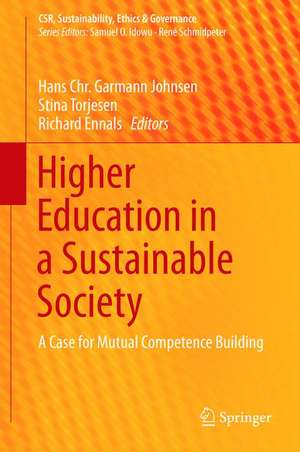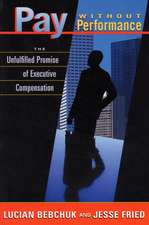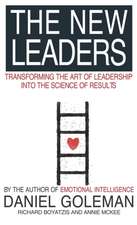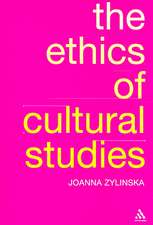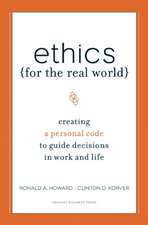Higher Education in a Sustainable Society: A Case for Mutual Competence Building: CSR, Sustainability, Ethics & Governance
Editat de Hans Chr. Garmann Johnsen, Stina Torjesen, Richard Ennalsen Limba Engleză Hardback – 9 apr 2015
| Toate formatele și edițiile | Preț | Express |
|---|---|---|
| Paperback (1) | 562.85 lei 38-44 zile | |
| Springer International Publishing – 6 oct 2016 | 562.85 lei 38-44 zile | |
| Hardback (1) | 573.76 lei 38-44 zile | |
| Springer International Publishing – 9 apr 2015 | 573.76 lei 38-44 zile |
Din seria CSR, Sustainability, Ethics & Governance
-
 Preț: 400.75 lei
Preț: 400.75 lei - 20%
 Preț: 879.88 lei
Preț: 879.88 lei - 18%
 Preț: 897.65 lei
Preț: 897.65 lei - 18%
 Preț: 1002.13 lei
Preț: 1002.13 lei - 18%
 Preț: 1013.02 lei
Preț: 1013.02 lei - 15%
 Preț: 645.28 lei
Preț: 645.28 lei - 20%
 Preț: 690.12 lei
Preț: 690.12 lei - 15%
 Preț: 646.62 lei
Preț: 646.62 lei - 15%
 Preț: 505.30 lei
Preț: 505.30 lei - 15%
 Preț: 647.40 lei
Preț: 647.40 lei - 24%
 Preț: 700.88 lei
Preț: 700.88 lei -
 Preț: 366.69 lei
Preț: 366.69 lei -
 Preț: 412.06 lei
Preț: 412.06 lei - 19%
 Preț: 549.68 lei
Preț: 549.68 lei - 20%
 Preț: 567.86 lei
Preț: 567.86 lei - 20%
 Preț: 575.49 lei
Preț: 575.49 lei - 24%
 Preț: 750.45 lei
Preț: 750.45 lei - 24%
 Preț: 823.00 lei
Preț: 823.00 lei - 18%
 Preț: 1003.70 lei
Preț: 1003.70 lei - 24%
 Preț: 692.28 lei
Preț: 692.28 lei - 20%
 Preț: 567.86 lei
Preț: 567.86 lei -
 Preț: 377.77 lei
Preț: 377.77 lei - 19%
 Preț: 472.32 lei
Preț: 472.32 lei -
 Preț: 367.40 lei
Preț: 367.40 lei - 20%
 Preț: 576.30 lei
Preț: 576.30 lei - 20%
 Preț: 587.28 lei
Preț: 587.28 lei - 20%
 Preț: 565.08 lei
Preț: 565.08 lei - 20%
 Preț: 565.89 lei
Preț: 565.89 lei - 20%
 Preț: 568.19 lei
Preț: 568.19 lei - 24%
 Preț: 822.45 lei
Preț: 822.45 lei - 20%
 Preț: 558.87 lei
Preț: 558.87 lei - 24%
 Preț: 1160.84 lei
Preț: 1160.84 lei - 24%
 Preț: 792.83 lei
Preț: 792.83 lei - 20%
 Preț: 573.76 lei
Preț: 573.76 lei - 24%
 Preț: 583.99 lei
Preț: 583.99 lei -
 Preț: 375.76 lei
Preț: 375.76 lei - 24%
 Preț: 688.02 lei
Preț: 688.02 lei -
 Preț: 388.13 lei
Preț: 388.13 lei - 24%
 Preț: 744.57 lei
Preț: 744.57 lei - 20%
 Preț: 593.48 lei
Preț: 593.48 lei - 19%
 Preț: 437.63 lei
Preț: 437.63 lei -
 Preț: 365.93 lei
Preț: 365.93 lei -
 Preț: 353.51 lei
Preț: 353.51 lei -
 Preț: 366.69 lei
Preț: 366.69 lei
Preț: 573.76 lei
Preț vechi: 717.20 lei
-20% Nou
Puncte Express: 861
Preț estimativ în valută:
109.79€ • 114.95$ • 91.06£
109.79€ • 114.95$ • 91.06£
Carte tipărită la comandă
Livrare economică 05-11 aprilie
Preluare comenzi: 021 569.72.76
Specificații
ISBN-13: 9783319159188
ISBN-10: 3319159186
Pagini: 243
Ilustrații: XIX, 301 p. 12 illus.
Dimensiuni: 155 x 235 x 22 mm
Greutate: 0.63 kg
Ediția:2015
Editura: Springer International Publishing
Colecția Springer
Seria CSR, Sustainability, Ethics & Governance
Locul publicării:Cham, Switzerland
ISBN-10: 3319159186
Pagini: 243
Ilustrații: XIX, 301 p. 12 illus.
Dimensiuni: 155 x 235 x 22 mm
Greutate: 0.63 kg
Ediția:2015
Editura: Springer International Publishing
Colecția Springer
Seria CSR, Sustainability, Ethics & Governance
Locul publicării:Cham, Switzerland
Public țintă
ResearchCuprins
Introduction.- Part 1: Sustainability in a humanistic and cultural perspective.- Part 2: Sustainability in life science.- Part 3: Sustainability in technology and planning studies.- Part 4: Sustainability and the teaching of management and business development.- Part 5: The sustainable university.- Conclusions.
Notă biografică
Hans Christian Garmann Johnsen is a professor in the Faculty of Economics and Social Sciences at the University of Agder in Norway and an adjunct professor at Gjøvik University College. Professor Garmann Johnsen is a specialist in the study of working life and innovation and is the Centre Leader at the Centre for Advanced Studies in Regional Innovation Strategies (RIS) at Agder. He has an MBA from the Norwegian School of Economics and Business Administration and gained his PhD at the Copenhagen Business School. His latest book is The New Natural Resource Knowledge Development, Society and Economics (2014). He also co-edited with Richard Ennals the book, Creating Collaborative Advantage: Innovation and Knowledge Creation in Regional Economies (2012).
Richard Ennals is Emeritus Professor of Corporate Responsibility and Working Life at Kingston University. He is part-time Professor at the University of Agder Department of Working Life and Innovation. He is an editor of the International Journal of Action Research and the European Journal of Workplace Innovation. He is author of Responsible Management: Corporate Responsibility and Working Life (Springer 2014). He contributed to the Encyclopaedia of CSR, the Dictionary of CSR and the Encyclopaedia of Action Research.
Stina Torjesen is Associate Professor at the School of Business and Law. She holds a DPhil in International Relations from the University of Oxford and is a former project manager in the sustainability consultancy SIGLA.
Richard Ennals is Emeritus Professor of Corporate Responsibility and Working Life at Kingston University. He is part-time Professor at the University of Agder Department of Working Life and Innovation. He is an editor of the International Journal of Action Research and the European Journal of Workplace Innovation. He is author of Responsible Management: Corporate Responsibility and Working Life (Springer 2014). He contributed to the Encyclopaedia of CSR, the Dictionary of CSR and the Encyclopaedia of Action Research.
Stina Torjesen is Associate Professor at the School of Business and Law. She holds a DPhil in International Relations from the University of Oxford and is a former project manager in the sustainability consultancy SIGLA.
Textul de pe ultima copertă
This book addresses the following question: What is a sustainable society, and how can higher education help us to develop toward it? The core argument put forward is that the concept of sustainability reaches much farther than just the direct aspects of environmental threats and carbon emissions. Using higher education as a point of departure, the book shows that sustainability involves a broad range of disciplines, from nursing and nutrition to technology and management. It argues that a sustainable society entails a distinct perspective on society that influences our social thinking in terms of ethics, democracy and knowledge development. The book also discusses if (and if so, how) higher education can and should contribute to such a development based on the principles of the freedom of science in a liberal, democratic society. The book presents Mutual Competence Building as a concept higher education can adapt in order to contribute to a sustainable Society.
Caracteristici
Showcases how higher education can support the development toward a more sustainable society Presents a view of sustainability that goes beyond the direct aspects of environmental threats and carbon emissions Outlines a distinct perspective on society that influences our social thinking in terms of ethics, democracy and knowledge development
